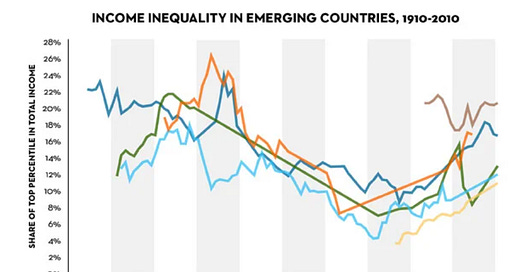The pandemic brought into focus the deep inequalities in our society. While many people around the world lost their source of income and faced terrible hardship, the wealth of billionaires grew by 27.5% during the lockdown, according to an estimate by the Swiss bank UBS.
Even before the pandemic, deepening inequality was a problem around the world. Capitalism and democracy, which seemed like the dominant force at the end of the Cold War, are facing an existential crisis.
What is the alternative?
Social democratic movements have failed to address the problem of inequality. The Soviet-style centralized planning is largely agreed to have failed. Inequality is rising almost everywhere in the world.
The world is again becoming more unequal. In the absence of any coherent ideology countering capitalism, people have turned to populism and nationalism in recent years across the world, creating the new reality of a world that is less open than before.
The margin of victory in the US Presidential election shows that this ideology still has takers.
What is the scenario in India?
Inequality is sharply rising in India. We have also seen this during the pandemic- the adverse effects affected different strata of the society disproportionately.
In India, the top 10 percentile of the population earns around 56% of the total income. It is also seen that the rate of growth of income is the highest for the top 10 percentile than for the rest of the population.
Economist Thomas Piketty argues that the returns from capital grows faster than the wage income and that when the rate of return on capital exceeds the rate of economic growth, inequality rises.
Should inequality be tackled? Is there a risk of social unrest because many people could perceive the current economic system stacked against them?
Corpo-Syndicalism
An ideology being discussed as an alternative to capitalism is corpo-syndicalism, that aims to address some of the pitfalls of capitalism.
Basic Principles:
Every adult is given a Central Bank account that has a fixed income deposited every month. (Universal Basic Dividend)
Companies in a corpo-syndicalist economy have all employees as equal partners (although not equally remunerated)
People get two kinds of income: Universal Basic Dividend and Salary for working in a corpo-syndicalist company.
There is no income tax and no sales tax of any kind.
The country makes money by imposing X% corporate tax rate on the revenues of the corpo-syndicalist company and also by leasing out land for private, limited use. (Land is owned by the community)
The government takes care of all public goods and services.
The ownership share of an employee in a corpo-syndicalist economy is non-tradable and non-transferrable. (There is no stock market and trading share in private markets is not possible)
The economist and former Greek Finance Minister Yanis Varoufakis claims that this would lead to companies being composed of small decision making units and would help to tackle anti-competitive actions by some of the biggest companies in the world today.
Criticism
Stifle Innovation: This system closes the door on entrepreneurs seeking seed capital from venture capitalist by offering a slice of ownership. Also, the entrepreneur is forced to give equal voting rights to every new joinee who joins the firm. Critics say that this system would stifle innovation
Unintended consequences: By affecting a radical overhaul of economic system, there could be unintended consequence that the proponents haven’t planned
This system still does not address the issues of gender and sexual politics, immigration and borders and the bill of digital rights
There is a risk that powerful figures could manipulate elections even under market socialism
Critics argue that this is a utopian ideology that could face challenges in implementation
One of the fundamental debates in economics is between efficiency and equity. Until now, the preference towards efficiency favored capitalism and the system seems to have generated prosperity for us but increased income inequality too. Measures such as hefty tax on super-rich are being proposed in some countries.
Would a new economic system based on equity solve the flaws of capitalism and socialism?
How else do you think we should combat inequality?
Like what you read? Share this article with your friends and follow us on:
Instagram| Medium| Facebook






